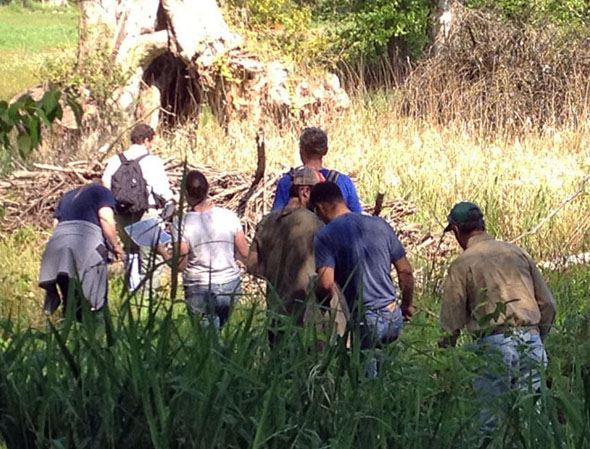
This training provides information and methods for determining the ordinary high water mark (OHWM) as defined in the state Shoreline Management Act (SMA). Waters regulated under the SMA include all tidal waters, streams greater than 20 cubic feet per second mean annual flow, water bodies greater than 20 acres in size, and any associated wetlands and deltas.
In this training, you will learn answers to these questions:
- How is the OHWM defined and where does it apply?
- What is the regulatory context and history of the OHWM?
- Why it is important to use field indicators to determine the OHWM?
- What are the most reliable field indicators on tidal waters, streams, lakes, and associated wetlands?
- What are some common misconceptions about OHWM determinations?
The three-day training includes two virtual sessions that will take place on Zoom on May 28 and May 29 (9:00 AM - 12:30 PM). On May 30, the participants will complete the field component of the training. Participants will practice how to determine the OHWM at four field sites in Yakima at Sportsman park with an instructor. Please block your calendar from 9:00 AM - 4:30 PM for the field component. Lunch will be provided on the field day.
The registration fee is $150 (16 AICP CM credits/ CEP Points).
Please reach out to Sara Brostrom (bros461@ecy.wa.gov) if you require an accommodation for this training (audio, visual, mobility, or other). Additionally, we can offer a couple of scholarship to cover the registration fees with each training. Please reach out if you need a scholarship in order to participate in the training.
Instructors
Chris Luerkens works in Ecology’s Bellingham Field Office, where he has been a shoreline and wetlands permit specialist since 2018. His work is largely focused on reviewing permits, and providing technical assistance to local jurisdictions, including Ordinary High Water Mark determinations. Chris has a BS in environmental science from WWU and has been working in natural resource management since 2005. His background includes work in water quality, fisheries, and local government as a planner.
Zach Meyer came to Ecology in 2015 from the University of Washington where he got his Master’s Degree in Marine and Environmental affairs and taught introductory biology. At Ecology, Zach has served as a shoreline planner, wetland and shoreline specialist, and since June 2022 has had the role of Wetlands and Shorelands Technical and Regulatory Lead.
Heather Rogers works in Ecology’s Headquarters Office, where she has been a fluvial geomorphologist for the Flood Unit since 2022. Her work is largely focused on channel migration zones and providing technical assistance to local jurisdictions and other state agencies. Heather has a MS in Geological Sciences and a professional certificate in Wetland Science and Management from the University of Washington. Her background includes work in geomorphology, geohazards, wetlands, research, consulting, and the federal government.
Leah Beckett is a Wetland Specialist with Ecology working out of the Northwest Region Office. Prior to Ecology, Leah had roles with city, state, and federal governments in wetlands and hydrological research, and taught biology and ecology courses at the undergraduate and graduate level. She earned a Ph.D. and a M.S. in Wetland Ecology from the University of Maryland and a B.S. in Ecology from Brevard College.
Doug Gresham is a wetland specialist in Ecology’s Northwest Region, and he has 24 years of consulting experience in wetlands, fisheries, water quality monitoring, mitigation design and monitoring, construction inspection, and permitting. He provides technical assistance on wetland protection to government agencies and consultants within King, Snohomish, Skagit, and San Juan Counties. He also conducts verification of consultant’s wetland delineations and ordinary high water mark determinations, and assesses the adequacy of their mitigation site designs and monitoring programs.
Ryan Anderson worked for Ecology’s Water Quality Program from 1998 until 2010. He managed floodplain restoration projects for the City of Yakima and Directed the Washington Resource Conservation and Development Council (WRC&D) between 2010 and 2023. At the WRC&D Ryan oversaw projects related to Wildfire and Climate Resilience, Salmon Recovery, and Water Quality. In 2023, Ryan returned to Ecology to work as a regional permitting specialist in for the Shorelines and Environmental Assistance Program. Ryan completed a BS in Biology form Gonzaga University in 1996 and an MS in Environmental Science from Washington State University in 2008.
